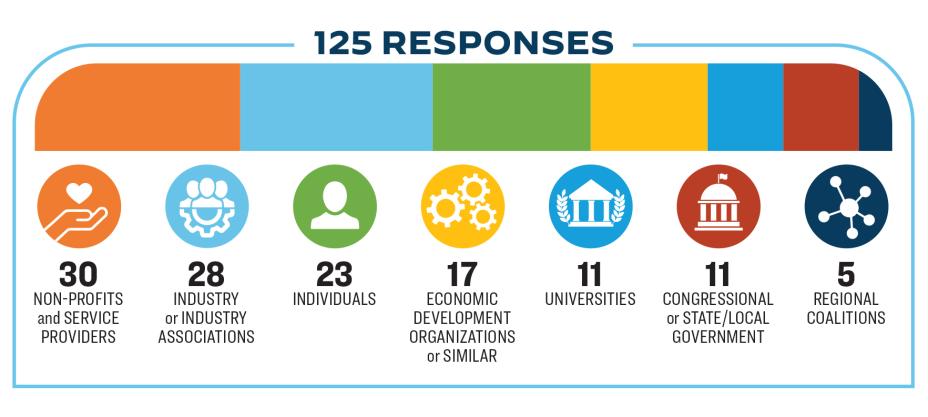Recompete Pilot Program - RFI Summary
In February 2023, the Economic Development Administration (EDA) issued a Request for Information (RFI) to solicit feedback on the Distressed Area Recompete Pilot Program (Recompete). EDA received 125 responses from organizations and individuals across the country by the close of the RFI on March 27, 2023. Each response was reviewed by EDA staff.
Respondents included a wide representation of Recompete stakeholders: non-profits and service providers (30); industry or industry associations (28); individuals (23); economic development organizations or similar entities (17); universities (11); Congressional or state/local government (11); and regional coalitions comprising a mix of these stakeholders (5). Respondents represented 31 states, the District of Columbia, Puerto Rico, and several national organizations.
In addition to the RFI, EDA conducted a Tribal Consultation session on March 9, 2023, that included a discussion of relevant data for Tribal communities. The Consultation received over 250 registrants, whose input is being incorporated into the program design. Please click here to see a summary of the input received from Tribal stakeholders.
Responses from both the RFI and Tribal Consultation have informed design decisions for the Phase 1 Notice of Funding Opportunity (NOFO), which was released in June 2023. Responses will continue to be used by EDA going forward, including in the design of the Phase 2 NOFO.

Key takeaways from the responses include:
- Eligibility: Respondents desired clear guidance on eligibility, while also emphasizing distressed regions have limited resources to support data analysis and research for major funding opportunities. On June 12, EDA, in partnership with Argonne National Laboratory, released the Recompete Eligibility Mapping Tool (Mapping Tool), a user-friendly map of areas that are eligible based on the statutorily required data about a region’s prime-age employment gap (PAEG) and median household income. The Mapping Tool also includes all Tribal lands and Pacific Ocean Territories. Prospective applicants can access the Mapping Tool here, along with instructional materials.
- Regional needs: Respondents articulated a broad range of contributors to a region’s prime-age employment gap (e.g., inequitable education and training, poor job quality, insufficient childcare, lack of access to capital). As discussed in the NOFO, the program has been designed to provide significant flexibility for applicants to address the necessary physical, social, and economic barriers to good jobs and career pathways. Given the nature of the program, EDA understands there may be a suite of necessary interventions to increase employment, job quality, and wages, such as wraparound services. Applicants will need to clearly explain how any requested EDA investments directly serve the purpose of the program.
- Regional assets: Respondents emphasized the importance of an assets-based approach, recognizing that while a community may be distressed, it still has existing institutions, industries, networks, and strategic initiatives to leverage. Applicants to Phase 1 will be encouraged to clearly articulate an approach that builds on their assets. As discussed in the NOFO, “Regional assets” is one of 6 evaluation criteria that Recompete Plan applicants will be scored against. Applicants who choose to submit Recompete Plans for approval should inventory existing community or regional assets that are specific to their geography and critical to reducing the prime-age employment gap.
- Partnerships and commitments: Respondents consistently referenced the importance of partnerships and ensuring buy-in from local entities to ensure Recompete activity is effective and equitable. EDA encourages potential applicants to bring together appropriate partners that broadly represent the region’s people and organizations in their efforts. As discussed in the NOFO, “Partnerships and potential commitments” is one of 6 evaluation criteria that Recompete Plan applicants will be scored against, as well as part of the evaluation criteria for Strategy Development Grant applicants.
- Applicant supports: Respondents articulated a need for applicants from distressed communities to have sufficient supports, including technical assistance. Strategy Development Grants were highlighted as one way to address this need, in addition to requests for EDA-sponsored support in the application process. As stated in the NOFO, through Phase 1 of this competition, applicants can pursue a Strategy Development Grant, approval of a Recompete Plan, or both. EDA anticipates approximately $6,000,000 to $12,000,000 in total being awarded in Phase 1 as Strategy Development Grants, which are intended to facilitate a region in becoming more competitive for future approval of a Recompete Plan and thus eventually for Implementation Grants. For applicants who apply for and receive both a Strategy Development Grant and Recompete Plan approval in Phase 1, EDA funding may be used for certain activities to prepare for their Phase 2 application. In addition, EDA will provide technical assistance between Phase 1 and Phase 2 applications in order to support development of implementation investment strategies.
In addition to these themes, the Recompete RFI process generated a large set of recommendations and best practices on understanding labor market dynamics, potential interventions, program evaluation, and other areas.
An archived page of the full Recompete Request for Information may be found at the Federal Register.
